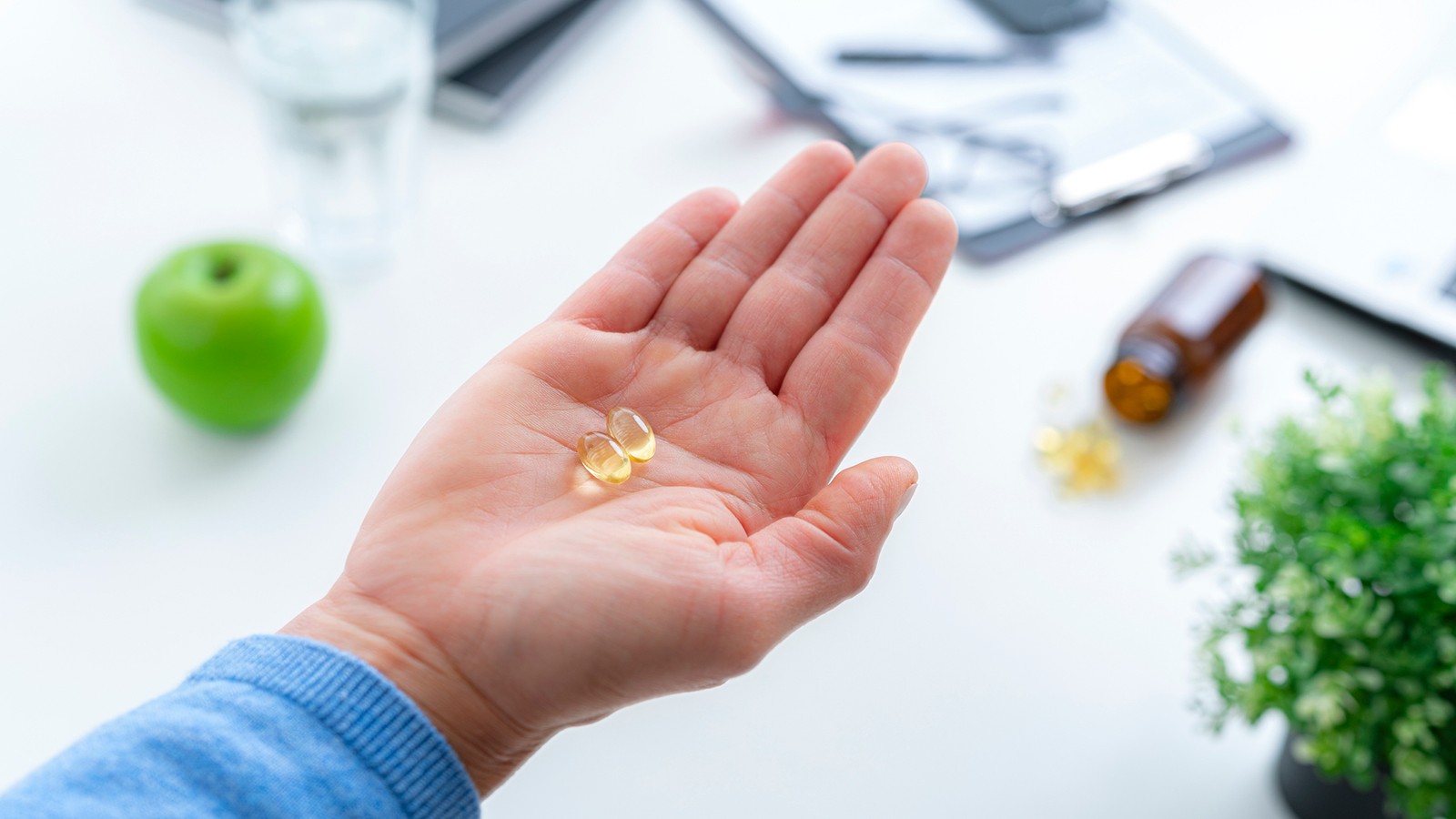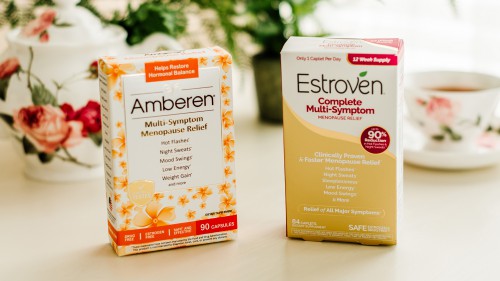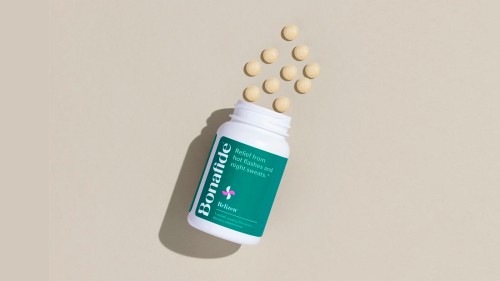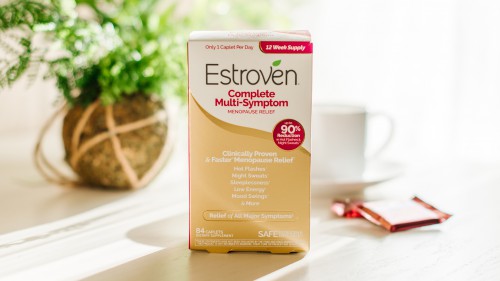A Dietitian Discusses 11 Popular Herbs and Supplements for Menopause
Published on September 7, 2021
Medically Reviewed by Anthony Dugarte, MD
Menopause is a normal rite of passage for women, but it can be accompanied by many uncomfortable symptoms. Dietary supplements might be able to help manage some of these symptoms when used in combination with the care of a healthcare provider. Here’s what you need to know before you buy.


Menopause is a time in a woman’s life that comes 12 months after their last menstrual cycle. During this time, the female reproductive hormones such as estrogen begin to decline.
These hormone alterations often bring on unpleasant symptoms such as hot flashes, night sweats, sleep disturbances, mood changes, decreased sex drive, and weight gain.
The average age for the onset of menopause is around 50 years old and can range from the early 40s to later 50s. (1)
The period before menopause can last about 4 years on average and is often called the perimenopause stage of life.
Hormone therapy and medications may be the first treatment your doctor recommends at this stage to offer menopause symptom relief.
However, natural herbs and supplement treatments may also be beneficial to use in conjunction with any needed medications and under the supervision of your healthcare provider.
While the research on supplements for menopause is somewhat mixed, several herbs and supplements hold the potential to offer a more natural menopause relief.
1. Black Cohosh
Black cohosh is a flowering plant native to eastern North America. It has been used for centuries in traditional Native American cultures to treat various ailments.
Black cohosh is also a common supplement for menopause symptoms such as hot flashes and night sweats.
A small 2018 study compared the effectiveness of black cohosh versus evening primrose oil for hot flashes. (2)
Black cohosh was shown to be more effective in decreasing the severity and frequency of hot flashes in menopausal women.
For most women, taking at least 20 mg of black cohosh daily appears to be effective. (3)
Potential side effects from taking black cohosh include mild nausea, upset stomach, and skin rash. (4)
Additionally, those who have a history of liver disease should not take black cohosh due to the potential risk of liver toxicity. (4)
Summary
Taking at least 20 mg of black cohosh daily may decrease the severity and frequency of hot flashes during menopause. Possible side effects are generally mild, but those with a history of liver disease should not take it.
2. Maca
Maca is a Peruvian vegetable in the same family as broccoli, cabbage, and Brussels sprouts.
It has been used for centuries to treat various health ailments, including anemia, fertility, and hormonal imbalances. It is also a common menopause herbal supplement.
A few smaller studies have shown maca to be significantly more effective in boosting sex drive and reducing feelings of anxiety and depression than placebo. (5)
However, larger, more high-quality studies are needed to confirm its effectiveness as a natural supplement for menopause.
There is not yet an optimal safe dose established, but most maca supplements are available in 500 mg capsules or a powder.
Even though there is no data on maca and any adverse effects, it’s recommended to consult with your doctor before starting it.
Summary
Maca is a herb that may boost sex drive and reduce symptoms of anxiety and depression during menopause. However, more research is needed on the optimal dose and any potential side effects.
3. Evening Primrose Oil
Evening primrose is a flowering plant native to central and eastern North America. Its seed oil is often used as a menopause supplement to reduce symptoms like hot flashes and bone loss.
One small randomized controlled trial was conducted on evening primrose oil (EPO) in 56 menopausal women. (6)
Participants in the treatment group were given 500 mg of EPO for 6 weeks. Those who received the EPO saw a 10% decrease in the severity of hot flashes.
However, another study didn’t show any effect. This 2019 study compared the effectiveness of a calcium supplement versus EPO combined with calcium and omega-3s for bone loss. (7)
Both treatment groups retained their bone mineral density, with neither being more effective than the other.
There is not a standard dose set for EPO, but 500 mg daily for 6 weeks has been shown to be safe and effective in some women in the available studies. (6)
Most side effects of EPO are reported to be mild and include nausea and stomach pain. However, EPO may interact with certain medications, including HIV medications. (8)
Always consult with your doctor before starting, especially if you are taking prescription medications.
Summary
Taking at least 500 mg of evening primrose daily may decrease the severity of hot flashes. However, side effects are possible, and EPO may interact with certain medications.
4. Valerian Root
Valerian is a flowering plant commonly used to improve sleep but is also used as a supplement for hot flashes and other menopause symptoms.
Its roots are used in a variety of herbal remedies intended to promote relaxation and reduce stress. It is also otherwise known as “nature’s Valium” and is thought to treat menopause symptoms such as insomnia and hot flashes. (9)
A small 2013 study involving 68 menopausal women found that valerian supplements were significantly more effective at reducing reported hot flashes than placebo. (10)
This was seen at a dose of 255 mg of valerian root 3 times per day for 8 weeks.
Another 2013 randomized controlled trial involving 100 women showed promise. In this study, valerian root combined with lemon balm was shown to improve sleep during menopause. (11)
However, when combining supplements in a research study, it can be difficult to determine which supplement is the primary driver of the results seen.
A typical dose for valerian root ranges from 300–600 mg per day.
Possible side effects of taking valerian root are typically mild and include headache, drowsiness, dizziness, and digestive upset. (9)
If you are taking any other medications for sleep, pain, or anxiety, taking valerian root can compound the effects of these medications.
Valerian root may also negatively interact with other supplements commonly used for menopause, including St. John’s wort, kava, and melatonin.
Summary
Valerian root is a supplement that may help reduce menopause symptoms such as insomnia and hot flashes. However, mild side effects are possible, and valerian root may interact with other supplements used for menopause symptoms.
5. Soy Isoflavones
Soy is perhaps one of the most common supplements for menopause symptoms. Soy contains compounds called isoflavones, which act similar to estrogen in the body. (12)
Since many of the symptoms associated with menopause are thought to be due to declining estrogen levels, there is potential for soy isoflavones to reduce menopause symptoms.
A 2009 research review on soy found that it may increase estradiol levels in postmenopausal women, which is the active form of estrogen. (13)
Another 2019 systematic review found that isoflavone supplements helped to alleviate hot flashes and reduced bone loss during menopause. (14)
Blood pressure and blood sugar levels were also improved.
A typical dose for a soy isoflavone supplement ranges from 25–100 mg per day.
However, a 2008 clinical trial demonstrated doses up to 900 mg per day to be safe for healthy menopausal women. (15)
The most common mild side effects reported are stomach pain and diarrhea. The research is still conflicting on the risk of taking soy in those at risk for breast cancer or who have breast cancer. (16, 17)
Consult your healthcare provider before adding soy isoflavones supplements to your routine, especially if you have a history of breast cancer.
Summary
Overall, soy isoflavones may be effective in improving menopause symptoms. More long-term research is still needed, particularly on the safety of soy isoflavone supplements and potential risks in women who have health problems.
6. Korean Red Ginseng
Ginseng is another common herbal supplement for menopause. It has been used for centuries in traditional Chinese medicine for its touted health benefits.
There are several types of ginseng, but Korean red ginseng (KRG) is most frequently used to ease menopause symptoms.
A 2016 systematic review of 10 randomized controlled trials provided some evidence that KRG may enhance sex drive, stabilize mood, and promote a general sense of well-being. (18)
In regards to KRG and hot flashes, the research is more mixed. For example, a 2009 clinical study showed no difference in hot flash frequency between the KRG-treated group and placebo group. (19)
Another 2013 research review of ginseng concluded that while there is some positive research on KRG and menopause, some of the studies may be biased. (20)
A typical dose for KRG is 200–400 mg per day.
The most commonly reported side effects include nausea, dizziness, trouble sleeping, headache, diarrhea, and skin rash. (21)
It may also interact with blood sugar, blood pressure, and cholesterol medications in some people.
Summary
Korean red ginseng (KRG) may help improve some menopause symptoms, but its long-term safety profile is still unknown. It is recommended to always consult with your medical provider before starting KRG, especially if you are taking any prescription medications.
7. St. John’s Wort
St. John’s wort is a yellow flowering plant that has been used in traditional European medicine for centuries. It is most commonly used to treat depression symptoms.
It is also touted as a menopause and depression remedy. It is often used as a natural supplement for both mood swings and hot flashes during menopause.
A 2010 randomized controlled trial was conducted in 100 menopausal women. For 8 weeks, participants took either St. John’s wort or a placebo. (22)
After 8 weeks, those taking St. John’s wort had significantly reduced severity in hot flashes compared to placebo.
Another small 2019 randomized trial demonstrated that taking St. John’s wort may be effective in reducing hot flashes and depression during menopause. (23)
There is also research into combining St. John’s wort and black cohosh for an even bigger benefit to mood than either supplement alone.
One 2007 observational study does support this theory, but more controlled trials are needed to prove this benefit. (24)
A typical dose for St. John’s wort is 300 mg, three times per day.
Side effects from taking St. John’s wort can range from mild to severe. (25)
Mild potential side effects include upset stomach, dry mouth, headache, fatigue, dizziness, confusion, sexual dysfunction, or sensitivity to sunlight.
St. John’s wort may also interact with certain prescription medications, including antidepressants.
It also may worsen psychotic symptoms in those with conditions such as schizophrenia and bipolar disorder.
Summary
St. John’s wort may reduce symptoms of menopause such as anxiety, depression, and hot flashes. Always consult with your medical provider before starting this supplement, especially if you have a mental health condition or are taking prescription medications.
8. Red Clover
Red clover is an herbal plant in the legume family. Like soy, it is also rich in isoflavones that may ameliorate menopause symptoms. (26)
Red clover is most commonly used to treat menopause symptoms such as hot flashes, night sweats, and bone loss.
A 2016 systematic review tested the effectiveness of red clover in relieving hot flashes and other menopause symptoms. The biggest benefit seen was a reduction in hot flashes. (27)
Another small 2004 randomized controlled trial showed that red clover may slow bone loss associated with menopause. (28)
However, a more recent 2012 randomized trial in postmenopausal women showed no such effects. (29)
A typical dose of red clover ranges from 40–80 mg per day of total isoflavones, but it has been studied in clinical trials of up to doses of 160 mg per day.
While rare, possible side effects of taking red clover include headache and nausea. The safety of taking red clover for longer than a year is also not yet known. (30)
Red clover may also not be safe for women with breast cancer or other hormone-sensitive cancers.
Summary
Red clover may help alleviate common menopause symptoms such as hot flashes and bone loss. However, the research is mixed.
9. Dong Quai
Dong quai is an Asian herbal remedy also known as female ginseng. It is related to the celery, carrot, and parsley family.
Dong quai is commonly used as a supplement for hot flashes during menopause. However, the research on its effectiveness as a single supplement is limited.
It’s important to note that most studies showing benefits were when dong quai was combined with other supplements.
A 2019 research review found that combining dong quai with other herbs such as red clover, black cohosh, and chamomile significantly reduced hot flashes and night sweats during menopause. (7)
When combined with other supplements, it’s difficult to determine which supplement is primarily responsible for the benefits seen.
Another 2005 research review was conducted on dong quai, which included a study of those taking dong quai alone. This study involved 71 menopausal women. (31)
The results showed no difference in menopause symptoms such as hot flashes or vaginal dryness between those taking dong quai versus placebo.
Based on the available studies to date, more research is needed to confirm the effectiveness of dong quai alone in easing menopause symptoms.
The typical dose for dong quai ranges from 3–15 grams per day.
It is found to be generally safe for most adults but may increase your skin’s sensitivity to the sun. (32)
It may also have a blood-thinning effect, and so it can pose a safety risk in those already taking blood-thinning medications. (33)
Summary
Dong quai may reduce menopause symptoms such as hot flashes and night sweats when combined with other supplements.
10. Flax Seeds
Flax seeds are commonly taken for many health reasons such as heart health, inflammation, constipation, and general health.
Flax seeds are otherwise known as linseed and are a rich source of lignans. Lignans are beneficial plant compounds that may improve health. (34)
They also possess estrogen-like activity and are therefore thought to relieve menopause symptoms.
Flax seeds can be taken as ground flax mixed in with food or as a flaxseed oil supplement.
A small 2015 study was done on flax seeds involving 140 menopausal women. (35)
Those who took flax seeds daily for 3 months reported significant improvements in various menopause symptoms and the overall quality of life.
However, another 2013 research review of 11 studies showed no difference in menopause symptoms in those taking flax seeds versus placebo. (36)
While the results are promising, more studies are still needed to confirm the effectiveness of flax seeds for menopause symptoms.
A typical dose for ground flax seeds is 1–2 tablespoons per day. For flaxseed oil, a typical dose is 1 gram of flaxseed oil per day.
Flax seeds and flaxseed oil is generally safe to take with minimal side effects. (37)
However, gas, bloating, and diarrhea may occur when taken in large doses with too little water.
Summary
Flax seeds have multiple health benefits and may help reduce menopause symptoms through estrogen-like activity. The research is still inconclusive, however.
11. Chasteberry
Chasteberry, also known as hypericum perforatum, is an herb native to Asia and the Mediterranean. It has long been used as a natural remedy for several women’s health issues.
One of the common reasons for taking chasteberry is to better manage menopause symptoms.
A recent small 2019 randomized controlled trial showed notable reductions in anxiety symptoms and hot flashes in those taking chasteberry. (38)
However, another 2009 randomized controlled trial was conducted involving 92 women that revealed no difference in symptoms in those taking chasteberry and St. John’s wort versus placebo. (39)
A typical dose of chasteberry ranges from 20–40 mg per day.
Chasteberry is generally considered safe when taken in lower doses, but an optimal dose is still unknown.
Mild side effects are possible, which include itchiness, headache, digestive issues, or nausea. It may also interact with antipsychotic medications or drugs for Parkinson’s disease. (40)
Summary
Chasteberry is an herb that may reduce symptoms of anxiety and hot flashes in menopausal women. However, an optimal dose is still not known.
The Bottom Line
Menopause is a time of many transitions in a woman’s life, and can bring on uncomfortable symptoms such as hot flashes, night sweats, sleep disturbances, mood swings, decreased sex drive, and weight gain.
While prescription medications are often the first-line treatment for menopause, many women may prefer natural remedies.
These natural remedies can often be used in conjunction with medications and a healthy menopause diet.
Many natural herbs and supplements have been studied for their use in easing menopause symptoms, but most need further research to confirm their effectiveness.
Many herbal supplements may also have side effects or interact with other supplements or medications.
Always consult with your healthcare provider about your menopause concerns before starting any new supplement regimen.
At WellnessVerge, we only use reputable sources, including peer-reviewed medical journals and well-respected academic institutions.
- The Timing of the Age at Which Natural Menopause Occurs:
https://www.ncbi.nlm.nih.gov/pmc/articles/PMC3285482/ - A comparative study on the effect of “black cohosh” and “evening primrose oil” on menopausal hot flashes:
https://www.ncbi.nlm.nih.gov/pmc/articles/PMC5868221/ - A comparative study on the effect of "black cohosh" and "evening primrose oil" on menopausal hot flashes:
https://pubmed.ncbi.nlm.nih.gov/29619387/ - National Institutes of Health: Black Cohosh:
https://ods.od.nih.gov/factsheets/BlackCohosh-HealthProfessional/ - Maca (Lepidium meyenii) for treatment of menopausal symptoms: A systematic review:
https://pubmed.ncbi.nlm.nih.gov/21840656/ - The effect of oral evening primrose oil on menopausal hot flashes: a randomized clinical trial:
https://pubmed.ncbi.nlm.nih.gov/23625331/ - Complementary and Alternative Medicine for Menopause:
https://pubmed.ncbi.nlm.nih.gov/30868921/ - National Center for Complementary and Integrative Health: Evening Primrose Oil:
https://www.nccih.nih.gov/health/evening-primrose-oil - National Institutes of Health: Valerian:
https://ods.od.nih.gov/factsheets/Valerian-HealthProfessional/ - The effects of valerian root on hot flashes in menopausal women:
https://pubmed.ncbi.nlm.nih.gov/24250592/ - Valerian/lemon balm use for sleep disorders during menopause:
https://pubmed.ncbi.nlm.nih.gov/24199972/ - National Library of Medicine: Isoflavones:
https://pubmed.ncbi.nlm.nih.gov/30893792/ - Effects of soy protein and isoflavones on circulating hormone concentrations in pre- and post-menopausal women: a systematic review and meta-analysis:
https://pubmed.ncbi.nlm.nih.gov/19299447/ - Isoflavone Supplements for Menopausal Women: A Systematic Review:
https://pubmed.ncbi.nlm.nih.gov/31689947/ - Effects of a high daily dose of soy isoflavones on DNA damage, apoptosis and estrogenic outcomes in healthy, postmenopausal women - a Phase I clinical trial:
https://www.ncbi.nlm.nih.gov/pmc/articles/PMC2574732/ - National Center for Complementary and Integrative Health: Soy:
https://www.nccih.nih.gov/health/soy - Dietary Isoflavones and Breast Cancer Risk:
https://www.ncbi.nlm.nih.gov/pmc/articles/PMC5590054/ - Ginseng for managing menopausal woman's health: A systematic review of double-blind, randomized, placebo-controlled trials:
https://pubmed.ncbi.nlm.nih.gov/27661038/ - A Clinical Study on the Effect of Red Ginseng for Postmenopausal Hot Flushes:
https://www.researchgate.net/publication/263402491_A_Clinical_Study_on_the_Effect_of_Red_Ginseng_for_Postmenopausal_Hot_Flushes - Ginseng for managing menopause symptoms: a systematic review of randomized clinical trials:
https://www.ncbi.nlm.nih.gov/pmc/articles/PMC3659624/ - Safety and tolerability of Korean Red Ginseng in healthy adults: a multicenter, double-blind, randomized, placebo-controlled trial:
https://pubmed.ncbi.nlm.nih.gov/30337818/ - Effect of St John's wort on severity, frequency, and duration of hot flashes in premenopausal, perimenopausal and postmenopausal women: a randomized, double-blind, placebo-controlled study:
https://pubmed.ncbi.nlm.nih.gov/20216274/ - The effect of Hypericum perforatum on postmenopausal symptoms and depression: A randomized controlled trial:
https://www.sciencedirect.com/science/article/abs/pii/S0965229919305631?via%3Dihub - Black cohosh with or without St. John's wort for symptom-specific climacteric treatment--results of a large-scale, controlled, observational study:
https://pubmed.ncbi.nlm.nih.gov/17590291/ - St. John's Wort and Depression: In Depth:
https://www.nccih.nih.gov/health/st-johns-wort-and-depression-in-depth - The Effect of Soy Isoflavones on the Menopause Rating Scale Scoring in Perimenopausal and Postmenopausal Women: A Pilot Study:
https://www.ncbi.nlm.nih.gov/pmc/articles/PMC5713750/ - Red clover for treatment of hot flashes and menopausal symptoms: A systematic review and meta-analysis:
https://pubmed.ncbi.nlm.nih.gov/26471215/ - The effects of phytoestrogen isoflavones on bone density in women: a double-blind, randomized, placebo-controlled trial:
https://academic.oup.com/ajcn/article/79/2/326/4690099?login=true - The effects of red clover on quality of life in post-menopausal women:
https://www.ncbi.nlm.nih.gov/pmc/articles/PMC3590693/ - National Center for Complementary and Integrative Health: Red Clover:
https://www.nccih.nih.gov/health/red-clover - Botanical and dietary supplements for menopausal symptoms: what works, what does not:
https://pubmed.ncbi.nlm.nih.gov/16181020/ - Chemical Information Review Document for Dong quai:
https://ntp.niehs.nih.gov/ntp/noms/support_docs/dong_quai090308.pdf - National Library of Medicine: Dong Quai:
https://pubmed.ncbi.nlm.nih.gov/30000896/ - Naturally Lignan-Rich Foods: A Dietary Tool for Health Promotion?:
https://www.ncbi.nlm.nih.gov/pmc/articles/PMC6429205/ - The effects of flaxseed on menopausal symptoms and quality of life:
https://pubmed.ncbi.nlm.nih.gov/25882265/ - Controlled flax interventions for the improvement of menopausal symptoms and postmenopausal bone health: a systematic review:
https://pubmed.ncbi.nlm.nih.gov/23571524/ - Mayo Clinic: Flaxseed and flaxseed oil:
https://www.mayoclinic.org/drugs-supplements-flaxseed-and-flaxseed-oil/art-20366457 - Comparison of Vitex agnus-castus Extracts with Placebo in Reducing Menopausal Symptoms: A Randomized Double-Blind Study:
https://pubmed.ncbi.nlm.nih.gov/31067851/ - Hypericum perforatum with Vitex agnus-castus in menopausal symptoms: a randomized, controlled trial:
https://pubmed.ncbi.nlm.nih.gov/18791483/ - National Center for Complementary and Integrative Health: Chasteberry:
https://www.nccih.nih.gov/health/chasteberry






